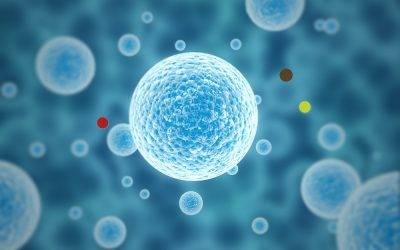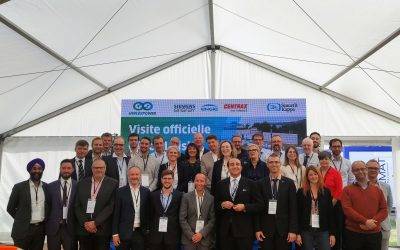CARAMBA: New Hope for Multiple Myeloma Patients
CARAMBA: the European pioneer for virus-free CAR-T cell immunotherapy against multiple myeloma
On 30th June 2023, the EU-funded project CARAMBA is coming to an end, marking five years of challenges and successes in the mission to revolutionise multiple myeloma treatment and beyond.
The ultimate goal of the CARAMBA project was to develop a new virus-free CAR-T therapy and demonstrate in a Phase I/IIa clinical trial the safety and efficacy of SLAMF7 CAR-T cells against multiple myeloma cells. In this innovative treatment approach, white blood cells of the myeloma patients are collected and equipped with a so-called “Chimeric Antigen Receptor” (CAR). The CAR acts like a sensor that detects the surface molecule SLAMF7 on myeloma cells and guides the white blood cells to specifically target and destroy these malignant cells. Currently, there is still no cure for multiple myeloma, a disease that affects more than 50,000 people in Europe every year. Therefore, there is a high clinical need for alternative treatments increasing not only the survival rate, but also patients’ quality of life.
A tough road to success
Like all pioneers, the highly motivated team around project coordinator Prof. Dr. Michael Hudecek (Universitaetsklinikum Wuerzburg) had to face several challenges on the way to patient treatment. One of it was the COVID-19 pandemic, which affected all European hospitals for more than two years with respect to intensive care beds and staff capacities. The innovative project character also influenced the clinical trial approval process which required a very close and positive interaction with all four regulatory authorities in Germany, Spain, France and Italy. The gained experience was always transparently shared with the community and especially with the collaboration project EURE-CART in a regulatory workshop in 2020.The approval of the clinical trial by the respective competent authorities and ethics committees in all four countries was a great success and represents a major milestone of the project.
“Due to the medicinal product novelty and the little experiences in Europe, it was always very important for us to stay in close dialogue with the regulatory authorities to flag disproportional burden on clinicians and patients desperately waiting for new treatments. Finally, we are very proud that CARAMBA was one of the pathfinders in Europe, paving the way for future CAR-T trials, which from now can benefit from the simplified and accelerated process” (Prof. Dr. Michael Hudecek, project coordinator).
Cutting-edge technology for safer, lower-cost patient treatment
Over the last few years, more and more scientists and companies made use of the revolutionising CAR-T technology, unlocking completely new research areas. Typically, the transfer of the CAR gene into the human genome is achieved by using viruses as transfer tool, a procedure that carries not only risks for patients but at the same time contributes significantly to the high CAR-T manufacturing costs. As a first of its kind, CARAMBA, pursues a virus-free CAR-T manufacturing approach making use of the “Sleeping Beauty” transposon technology, which has been developed under the lead of Prof. Dr. Zoltán Ivics (Paul-Ehrlich-Institut). In addition to the more favourable safety profile compared to the viral approach, the manufacturing costs for the virus-free production are also significantly lower, making CAR-T production with the Sleeping Beauty technology an even more attractive therapeutic alternative. In a first in human Phase I study with 9 patients, the safety of the SLAMF7 CAR-T product was tested. The treatment with SLAMF7 CAR-T was well tolerated, and importantly, no dose-limiting toxicities were observed. This demonstrates that the new gene transfer technique is feasible and safe, paving the way for safer and less costly CAR-T therapies.
Exploiting the potential of SLAMF7 CAR-T therapy
In the CARAMBA clinical trial, nine patients received SLAMF7 CAR-T cells in a carefully planned dose escalation scheme, the treatment was well tolerated and affirmed SLAMF7 as a therapeutic target for immuno-therapy in multiple myeloma. However, treatment with higher cell doses may result in more pronounced therapeutic effects. To exploit the full potential of SLAMF7 CAR-T cells, it is planned to continue with the CARAMBA-1 study also after the project end with the aim to complete the patient cohorts also at the highest dose level.
Establishing next-generation procedures for European CAR-T manufacturing
To supply European patients with CAR-T cells does not only require new technologies, but also strongly depends on European standardised manufacturing processes ensuring increased CAR-T cell accessibility in Europe and reducing global dependencies. Under the lead of Prof. Dr Halvard Bönig (DRK-BSD), CARAMBA was able to establish the innovative manufacturing process developed by the UKW in a GMP compliant manner at the DRK-BSD, based at the logistically strategic location in Frankfurt. Within the project, the team around Prof. Bönig optimised the GMP manufacturing process to highest European standards, and the process is currently being adapted for the production of future CAR-T cell products. As such, CARAMBA has paved the way for the next generation of CAR-T cell therapies.
About CARAMBA
The EU-funded CARAMBA project has started in 2018 and is supported with a funding of 6.1 Mio €. Within CARAMBA, ten partners of six EU countries are closely collaborating, among those four clinical centres of excellence for cancer treatment: Apart from the Universitaetsklinikum Wuerzburg (UKW), which leads the project as coordinating institution, the Italian Ospedale San Raffaele (Milan), the Spanish Universidad de Navarra (Pamplona) and the French Centre Hospitalier Régional Universitaire de Lille (CHU Lille) are represented as clinical partners. Further project partners are the GMP manufacturer DRK-Blutspendedienst Baden-Wuerttemberg – Hessen (DRK-BSD), the German Paul-Ehrlich-Institut – Federal Institute for Vaccines and Biomedicines (PEI), the patient organisation Myeloma Patients Europe (MPE), the biotech companies NBE Therapeutics (Switzerland) and T-CURX (Germany) as well as the German project management provider ARTTIC Innovation.
Further information
www.caramba-cart.eu
Twitter: @CARAMBA_project
LinkedIn: CARAMBA Project
Press contact
Florian Riegel
Senior Communications Manager
ARTTIC Innovation GmbH
Tel: +49 89 2488303 29
florian.riegel@arttic-innovation.de
This project has received funding from the European Union’s Horizon 2020 research and innovation programme under grant agreement No 754658.
ARTTIC Innovation GmbH has been advising research and innovation projects for more than 33 years. As project management and communication partner, we make sure that our projects run successfully and that project results and events are disseminated in the best possible way. ARTTIC is a subsidiary of the PNO Group, one of the largest consultancies for publicly funded projects in research and development. For more information, please visit www.arttic-innovation.de.
Why the carousel of amendments to the R&D tax credit law continues to turn
The R&D tax credits in 2024The year 2024 has proven to be decisive for the German R&D tax credits. Following the most recent amendment as part of the Growth Opportunities Act in March, the Federal Government realized during the budget consultations for 2025...
Register Now: In Conversation with EBiSC2
Unlocking the Potential of Stem Cells: Discover the EBiSC Journey to SustainabilityJoin the conversation on the initiative that’s shaping the future of biomedical research! On May 15, 2024, from 14:15 to 15:00 CEST (Europe/Brussels time), the Innovative Health...
The R&D tax credit with a blind eye to earnings –
Why loss-making companies (wrongly) hesitate
Recapitulation The German R&D tax credit has become much more popular in recent years after a modest response following the introduction of the instrument. This can be seen not only in advertising and studies by various associations, but also in the bare figures...
Junior Funding Consultant (m/f/d)
We offer you the unique opportunity to become part of a successful & young team in the attractive growth market for tax-incentivised research funding (R&D tax credits). We are looking for Junior Funding Consultants with a passion for innovation, scientific...
First successful demonstration with 100% green H2
HYFLEXPOWER celebrates successful operation of a gas turbine with 100% green H2On October 12, 2023, at a public event hosted at the HYFLEXPOWER demonstrator site in Saillat-sur-Vienne, France, the HYFLEXPOWER consortium unveiled a ground-breaking achievement - the...
New Security Project AGILE Will Improve Disaster Risk Management
New international security project to improve disaster risk management for unexpected eventsThe international security project AGILE will kick start today. The project is to develop novel tools and methodologies for understanding, anticipating, and managing High...
SYNERGISE for Improved Disaster Management
Internationally Funded Project to Develop an Integrated Toolkit for Improved Management of Natural and Man-Made Disasters Kicks-Off TodayTo boost the efficiency and safety of first responders during life-saving missions, the SYNERGISE team will develop a Novel...
Junior Innovation Consultant (m/f/d)
We offer you the unique opportunity to become part of a dynamic team in the attractive field of innovation and research. We are looking for Innovation Consultants with a passion for innovation, scientific writing and project management. This position is for recent...
Senior Innovation Consultant (m/f/d)
We offer you the unique opportunity to become part of a dynamic team in the attractive field of innovation and research. We are looking for specialists with a passion for innovation, scientific writing and project management. This position is for experienced...
Business Developer (m/f/d)
We are looking for specialists in business development with a strong sales talent and an interest in innovation, research and science. This position is for recent graduates or experienced professionals and involves assisting clients from a variety of industries with...









